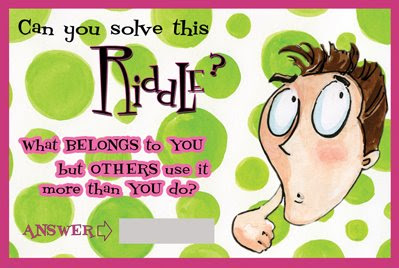

Defining a Riddle
A riddle is a statement, question, or phrase that has a double meaning. A riddle can also be described as a puzzle to be solved. When someone uses a riddle, it can be a thought provoking challenge to figure it out on your own, or it can be a funny comment that makes you laugh. Riddles can be great brain busters or conversation starters to get you think.
A riddle is as hard or as simple as you and the person youЁЏre telling makes it. The answer can be right in front of your nose and even in the riddle itself, or it can be difficult and hard to comprehend. It depends on how much you open your mind to the possibilities.

History of Riddles
Riddles came from old English poetry. Their literary ancestry dates all the way back to Plato and Aristotle. In ancient Greece, riddles were used as a cunning tool, to demonstrate wit and wisdom.
Writers in poetry also began expressing themselves through riddles. When a poem contains a riddle, the readerЁЏs mind can be stimulated and the writer can successfully get their message across in a more interesting way. Some poetry even has answers to it that you had to riddle out.
Theater is another place where riddles show up. Shakespeare was famous for his works, which had a lot of riddles in them. For example, in Romeo and Juliet, Romeo proclaimed his love in a riddle for the audience to interpret.
Today, examples of riddles can be found in movies as well. For example, in the movie Saw, Jigsaw the main character engages men and women in a riddle to save their lives. Most of the time the answer is simple, but some are difficult to comprehend. One of his riddles is ЁАDo you feel you have enough faith to stick this out, or do you need the help of some higher power? Look around salvation may be right across the room.ЁБ The answer to that riddle was a cross.
Riddles can be used in a contest of wit and skill, sort of like a guessing game. Riddle games have been played since ancient times, and are still being played today.
SAMPLE RIDDLES

1. It walks on four legs in the morning, two legs at noon and three legs in the evening.
What is it?
2. I am the beginning of the end, and the end of time and space. I am essential to creation, and I surround every place. What am I?
3.What always runs but never walks, often murmurs, never talks, has a bed but never
sleeps, has a mouth but never eats?
4.I never was, am always to be. No one ever saw me, nor ever will. And yet I am the
confidence of all, To live and breathe on this terrestrial ball. What am I?
5.At night they come without being fetched. By day they are lost without being stolen.
What are they?
6.There was a green house. Inside the green house there was a white house. Inside the white house there was a red house. Inside the red house there were lots of babies.
What is it?
7.What is in seasons, seconds, centuries and minutes but not in decades,
years or days?
8.Think of words ending in -GRY. Angry and hungry are two of them. There are only three words in the English language. What is the third word? The word is something that everyone uses every day. If you have listened carefully, I have already told you what it is.
9.The more you have of it, the less you see. What is it?
10.What has a head, a tail, is brown, and has no legs?
11.I am always hungry,
I must always be fed,
The finger I touch,
Will soon turn red
12.I give you a group of three. One is sitting down, and will never get up. The second eats as much as is given to him, yet is always hungry. The third goes away and never
returns.
13.I have four legs but no tail. Usually I am heard only at night. What am I?
14.When young, I am sweet in the sun.
When middle-aged, I make you gay.
When old, I am valued more than ever.
15.All about, but cannot be seen,
Can be captured, cannot be held,
No throat, but can be heard.
16. If you break me
I do not stop working,
If you touch me
I may be snared,
If you lose me
Nothing will matter.
17.Each morning I appear
To lie at your feet,
All day I will follow
No matter how fast you run,
Yet I nearly perish
In the midday sun.
18. At the sound of me, men may dream
Or stamp their feet
At the sound of me, women may laugh
Or sometimes weep
19. Say my name and I disappear. What am I?
20. What is it that after you take away the whole, some still remains?
1. Man (or woman). Crawls on all fours as a baby, walks on two legs as an adult and uses two legs
and a cane when they're old.
2. The letter e. End, timE, spacE, Every placE
3. A river.
4. Tomorrow or the future.
5. The stars.
6. A watermelon.
7. The letter 'n'.
8. It states, "There are only three words in the English language. What is the third word?" The third
word of that phrase is of course "language." Don't get angry at me, I didn't make it up :)
9. Darkness
10. A penny.
11. Fire
12. Stove, fire, smoke
13. A frog. The frog is an amphibian in the order Anura (meaning "tail-less") and usually makes
noises at night during its mating season.
14. Wine
15. The wind
16. Your heart
17. Shadow
18. Music
19. Silence
20. Wholesome



- ЁЄ[ЧЪРкЖѓПюСі] 6Пљ 16РЯКЮХЭ ЧЪРкЖѓПюСі КЏАцЕШ РЬПыОШ...
- ЁЄИЖДвЖѓ ОюЧаПЌМіЛ§ЕщРЛ РЇЧи ЧЪРкДхФФРЬ СЄМКВЏ ...
- ЁЄОюЧаПЌМіЛ§КаЕщ И№ЕЮ ИЖДвЖѓ ФЁХВ ИР С§ ЧЪРк Дх...
- ЁЄОюЧаПЌМіЛ§КаЕщРЛ ИЖДвЖѓ ЧЧРк ИРС§ ЧЪРк ЖѓПюСі...
- ЁЄИЖДвЖѓ ЧЪРк ЖѓПюСіРЧ ЛяАуЛь ЦФЦМПЁ ОюЧаПЌМіЛ§...
- ЁЄИЖДвЖѓ ОюЧаПЌМіЛ§ЕщРЧ ФЁХВ ИРС§ ХНЙцБт ЧЪРк ...
- ЁЄОюЧаПЌМіЛ§ЕщРЬ РЮСЄЧб ЧЧРк ИРС§ ЧЪРк ИЖДвЖѓ ...
- ЁЄОюЧаПЌМі Л§ЕщРЬ УЃДТ ЧЪИЎЧЩ ЛяАуЛь ИРС§РК? ИЖ...
- ЁЄИЖДвЖѓ ОюЧаПЌМі Сп ФЁХВ ИРС§РЛ УЃРИНХДйИщ ЧЪ...
- ЁЄОюЧаПЌМі Л§ЕщРЬ РЮСЄЧб ЧЪИЎЧЩ ЧжЧУЗЙРЬНК!! ЧЪ...
- ЁЄЧЪИЎЧЩ ОюЧаПЌМіЛ§ЕщРЬ УЃДТ ЛяАуЛь ИР С§РЛ Мв...
- ЁЄИЖДвЖѓ ОюЧаПЌМі Сп ЧбБЙНФ ОчГфФЁХВРЬ Л§АЂГДй...
- ЁЄЧЪИЎЧЩОюЧаПЌМі Сп ИРРжДТ ЛяАуЛьРЬ ИдАэ НЭДйИщ...
- ЁЄИЖДвЖѓ АЁСЗ ПЌМі Сп ЧЧРкАЁ Л§АЂГДйИщ ЧЪРкДх...
- ЁЄЧЪИЎЧЩ ЧіСі РЏЧаПјПЁМ ПфСђ ЧжЧб ИРРжДТ ФЁХВ ...







 ЧЪРкДхФФ ОпАЃЛѓДу ПРЧТ
ЧЪРкДхФФ ОпАЃЛѓДу ПРЧТ 13ГтПЌМг МвКёРкИИСЗ 1РЇ
13ГтПЌМг МвКёРкИИСЗ 1РЇ

 ГЛАд ИТДТ ОюЧаПј УЃБт
ГЛАд ИТДТ ОюЧаПј УЃБт
 ИЎОѓ ЧаБГ ЙцЙЎБт
ИЎОѓ ЧаБГ ЙцЙЎБт
 СжИЛПЁ ГЛАЁ ОЕ КёПыРК?
СжИЛПЁ ГЛАЁ ОЕ КёПыРК? УжАэАЁМККё РЬКЅЦЎ СёБтБт
УжАэАЁМККё РЬКЅЦЎ СёБтБт
 ЧіСіПЁМЕЕ ЧЪРкДхФФ!
ЧіСіПЁМЕЕ ЧЪРкДхФФ! ЧіСіПЁМ АЁДЩЧб
ЧіСіПЁМ АЁДЩЧб









 ЧЪРк ЦЏБо Ч§ХУ! ФСНУОюСі МКёНК
ЧЪРк ЦЏБо Ч§ХУ! ФСНУОюСі МКёНК






































